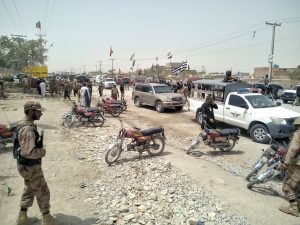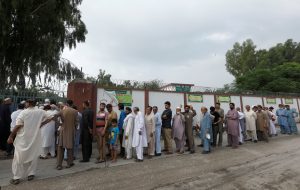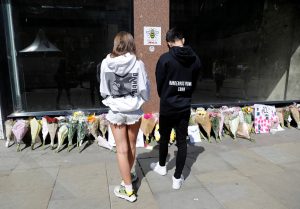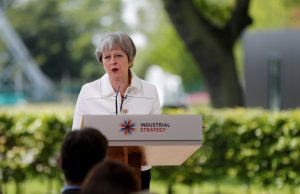
By Gul Yousafzai Jibran Ahmad
QUETTA/PESHAWAR, Pakistan (Reuters) – A suicide bomber killed at least 29 people near a polling center as Pakistanis voted on Wednesday in a knife-edge general election pitting cricket hero Imran Khan against the party of jailed ex-Prime Minister Nawaz Sharif.
Neither Khan nor Sharif is likely to win a clear majority in the too-close-to-call election, with results likely to be known by around 2 a.m. local time on Thursday (2100 GMT Wednesday).
The Islamic State militant group claimed responsibility for the attack that hospital officials said killed 29 people and wounded 35 in the western city of Quetta. Security sources said the bomber drove his motorcycle into a police vehicle.
About 106 million people were registered to vote in polls which closed at 6 p.m (1300 GMT).
Sharif’s party had called for voting to be extended by an hour, saying people were still lining up and could be turned away without casting ballots. TV channels said election officials denied the request.
About 371,000 soldiers have been stationed at polling stations across the country, nearly five times the number deployed at the last election in 2013.
(GRAPHIC: Pakistan Election – https://tmsnrt.rs/2LaIlGt)
Earlier this month, a suicide bomber killed 149 people at an election rally in the town of Mastung in Baluchistan province. That attack was also claimed by Islamic State militants.

Security officers gather at the site of a blast outside a polling station in Quetta, Pakistan, July 25, 2018. REUTERS/Naseer Ahmed
Khan has emerged as a slight favorite in national opinion polls, but the divisive race is likely to come down to Punjab, the country’s most populous province, where Sharif’s party has clung to its lead in recent surveys.
The election has been plagued by allegations the powerful armed forces have been trying to tilt the race in Khan’s favor after falling out with the outgoing ruling party of Sharif, who was jailed on corruption charges this month.
“Imran Khan is the only hope to change the destiny of our country. We are here to support him in his fight against corruption,” said Tufail Aziz, 31, after casting his ballot in the north-western city of Peshawar.
ANTI-CORRUPTION CRUSADER
Whichever party wins, it will face a mounting and urgent in-tray, from a brewing economic crisis to worsening relations with on-off ally the United States to deepening cross-country water shortages.
An anti-corruption crusader, Khan has promised an “Islamic welfare state” and cast his populist campaign as a battle to topple a predatory political elite hindering development in the impoverished mostly-Muslim nation of 208 million people, where the illiteracy rate hovers above 40 percent.
“This is the most important election in Pakistan’s history,” Khan, 65, said after casting his vote in the capital, Islamabad.
“I ask everyone today – be a citizen, cherish this country, worry about this country, use your vote.”
Khan has staunchly denied allegations by Sharif’s Pakistan Muslim League-Nawaz (PML-N) party that he is getting help from the military, which has ruled Pakistan for about half of its history and still sets key security and foreign policy in the nuclear-armed nation. The army has also dismissed allegations of meddling in the election.

People stand in a line as they wait for a polling station to open, during general election in Rawalpindi, Pakistan July 25, 2018. REUTERS/Faisal Mahmood
STRUGGLE TO WIN
Khan’s Pakistan Tehreek-e-Insaf (PTI) party has inched ahead of PML-N in recent national polls, but even if it gets the most votes, it will likely struggle to win a majority of the 272 elected seats in the National Assembly, raising the prospect of weeks of haggling to form a messy coalition government.
Such a delay could further imperil Pakistan’s economy, with a looming currency crisis expected to force the new government to turn to the International Monetary Fund for Pakistan’s second bailout since 2013. PTI has not ruled out seeking assistance from China, Islamabad’s closest ally.
Sharif’s PML-N has sought to turn the vote into a referendum on Pakistan’s democracy and has said it was campaigning to protect the “sanctity of the vote”, a reference to a history of political interference by the military.
“I voted for PML-N because of Nawaz Sharif’s struggle for the rule of constitution and supremacy of the parliament,” said Punjab voter Muhamad Waseem Shahzad, 41, a farmer. “We want to get rid of the system that steals peoples’ mandate.”
The Pakistan Peoples Party (PPP), which has been overtaken by Khan’s PTI as the main challenger to PML-N, has also alleged intimidation by spy agencies.
Sharif’s PML-N has been touting its delivery of mega infrastructure projects, especially roads and power stations that helped hugely reduce electricity blackouts, as proof the country is on the path to prosperity.
“If we get the opportunity, we will change the destiny of Pakistan,” said Shehbaz Sharif, brother of Nawaz and the PML-N president, as he cast his vote in Lahore. “We will bring an end to unemployment, eradicate poverty and promote education”.
PML-N’s campaign was reinvigorated by the return to Pakistan of Nawaz Sharif, 68, who was earlier this month convicted and sentenced in absentia to 10 years in prison over the purchase of upscale London apartments using offshore companies in the mid-1990s. He has denied any wrongdoing.
The election will be only the second civilian transfer of power in Pakistan’s 71-year history.
(Additional reporting by Syed Raza Hassan in Karachi and Mubasher Bukhari in Lahore; Writing by Drazen Jorgic; Editing by Alex Richardson and Raju Gopalakrishnan)








